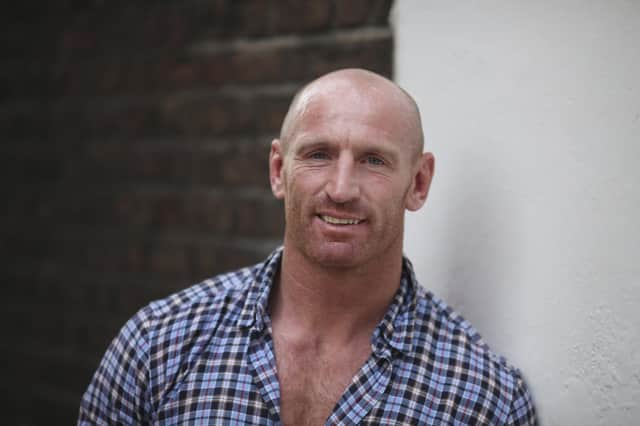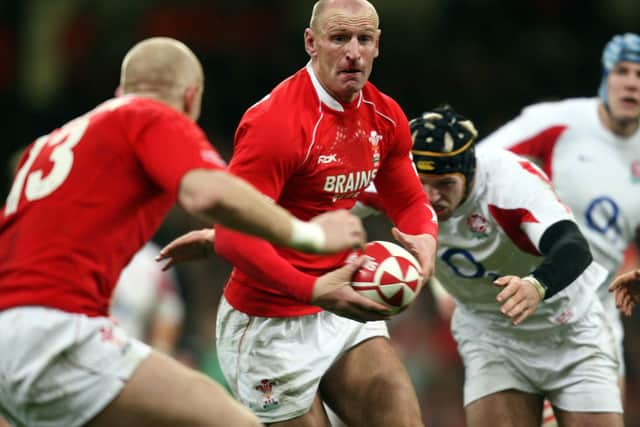Gareth Thomas - the sports star who dared to speak out about his sexuality


Retired rugby star Gareth Thomas is a sporting legend, not just for once being the most-capped Welsh player on the pitch but for his work advocating for LGBTQ+ rights.
The now 47-year-old made history when he became the first openly gay rugby union player in 2009, facing a media frenzy at a time when there was scant recognition of diverse sexualities and identities in sport. In 2019, he revealed he was HIV positive, and has been tirelessly campaigning to end the stigma around the condition ever since.
Advertisement
Hide AdAdvertisement
Hide Ad“When I look back I think my proudest career moment was when I felt I could finally be authentic, and still continue to play rugby,” he says. “That was a career and life-defining moment for me.” Coming out as gay at that time was a significant thing to do – and it wasn’t easy. “It was at a time when nobody in rugby, and nobody since – at the level that I was playing at – had done it before. There wasn’t understanding or knowledge. There wasn’t an environment of myself or anyone else knowing what was going to happen. I’ll be honest, it angered me and I was very fearful. Even though I thrived on fear as a rugby player, what I didn’t want was everything I’d worked so hard for to all of a sudden become irrelevant. The fear for me, my teammates and my family was huge.”


There wasn’t a great deal of official support forthcoming either. “Things were very reactive,” he says. “ I would face a torrent of abuse and then things would be put in place. Organisations say they’re ready for diversity and inclusion, but when someone becomes very diverse in a non-diverse environment, people realise that it’s nowhere near where it needs to be.”
In the months leading up to his announcement, Thomas felt a certain amount of pressure not to speak out. “Through lack of knowledge or ignorance, people become abusive. It became difficult for me, because I didn’t change at all – I was still the same person, but I just spoke about something that was always a part of me. I think people expected me to be completely different overnight, but the rugby player hadn’t changed at all.
“There’s this idea that people always fight for things because they want to be celebrated for it, but it’s not that. Sometimes they just want to be able to be the person they really are and be treated equally.” Thomas says he sometimes feels frustrated as an openly gay person in the public eye that people automatically assume he wants to be an outspoken activist. “If someone spoke about sexuality in the world of football, I guarantee you my phone would be red-hot. Tom Daley’s phone would probably also be red-hot. I think as a reader or viewer, I’d rather hear the views of a heterosexual footballer, like Alan Shearer, or Gary Lineker.
Advertisement
Hide AdAdvertisement
Hide Ad“People know what my views are. I’m really passionate and will fight tooth and nail for equality for everybody, but I think we need to start changing the voices in these conversations. Talking about lived experience is always going to be very powerful, but we need to hear from a diverse range of voices and widen the pool because that’s what people are going to listen to. There would be so many non-gay footballers who would support a gay footballer speaking openly about his sexuality, yet nobody seems to find that a point of interest.”
Overall, Thomas feels that things have changed for the better over the past decade when it comes to talking openly about sexuality, but there is still a way to go. “Things are progressing, but discrimination hasn’t gone away. I was reading that in this Olympics there are three times as many out LGBTQ+ athletes, but how many could you actually name? It’s also still illegal to be gay in 69 countries in the world. There’s definitely still so much work that needs to be done on all levels to create an environment where people can have the ability to be authentic and play sport.”
Comment Guidelines
National World encourages reader discussion on our stories. User feedback, insights and back-and-forth exchanges add a rich layer of context to reporting. Please review our Community Guidelines before commenting.